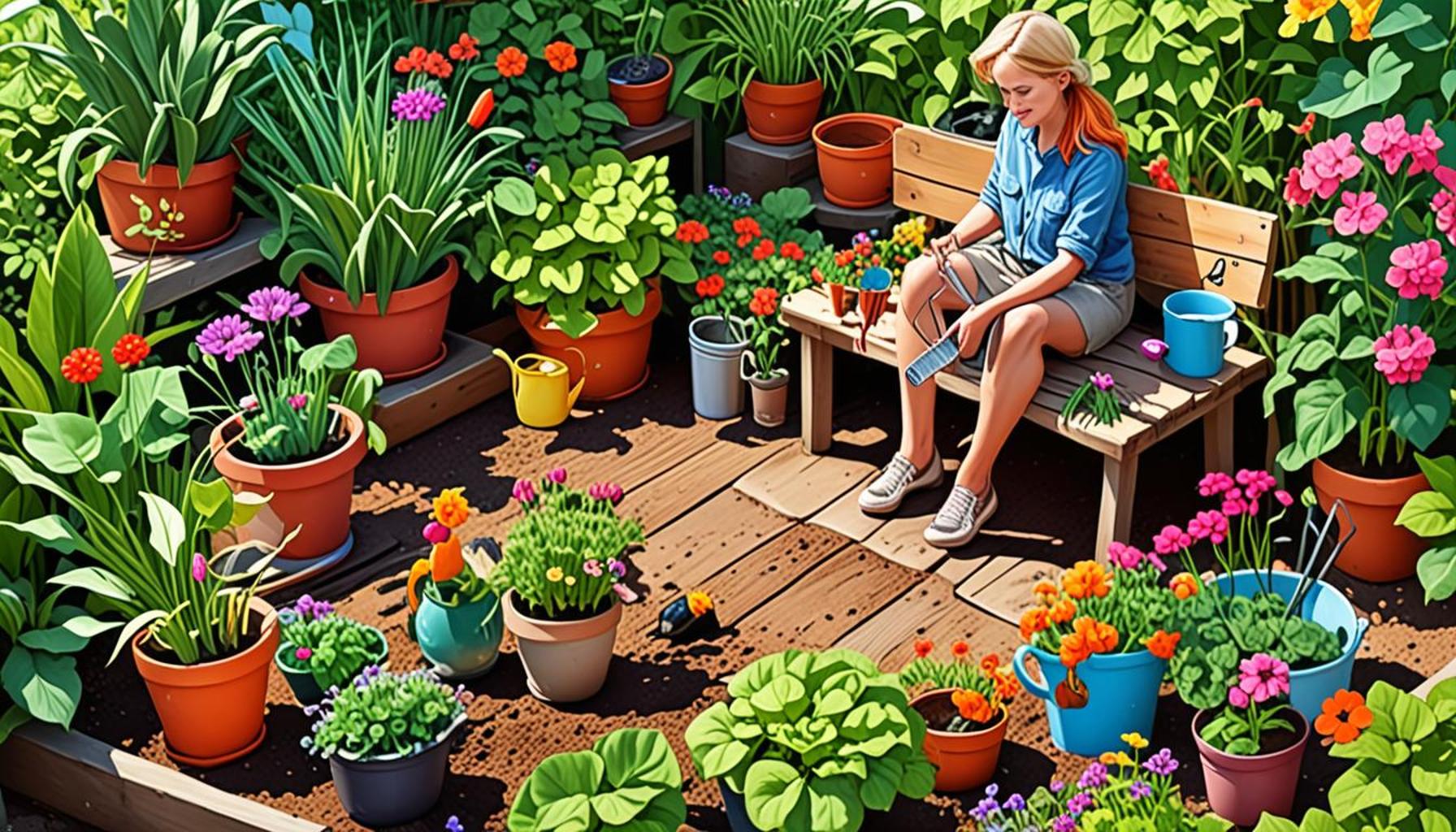The Connection between Gardening and Well-Being: Cultivating Outdoor Hobbies

Unveiling the Many Advantages of Gardening
Engaging with nature can significantly enhance our quality of life. Gardening isn’t just a hobby; it’s a transformative experience that fosters both physical and mental well-being. Numerous studies indicate that spending time outdoors can reduce stress, improve mood, and even boost productivity. Additionally, the act of nurturing plants allows individuals to cultivate patience and resilience—virtues that translate into various aspects of life.
Key Benefits of Gardening
- Physical Activity: Activities such as digging, planting, and weeding are excellent forms of exercise. According to the Centers for Disease Control and Prevention (CDC), gardening can burn as many calories as a moderate workout, making it a fun way to stay fit.
- Mental Clarity: The repetitive tasks of gardening can lead to a meditative state. Studies suggest that this mindfulness can enhance cognitive function and clarity, allowing for improved focus and productivity in daily tasks.
- Connection to Nature: Being outdoors fosters a sense of belonging and peace. Nature serves as a backdrop that can reduce feelings of isolation and anxiety, promoting emotional healing and tranquility.
- Nutrition: Growing your own vegetables promotes healthier eating habits. Homegrown produce is often more nutritious than store-bought options, and the satisfaction of eating the fruits (and vegetables) of your labor encourages a deeper appreciation for one’s diet.
In the United States, community gardens have emerged as a popular solution to urban isolation, bringing people together. These shared green spaces not only provide fresh fruits and vegetables but also foster community spirit and cooperation. Participants can learn from each other, share resources, and forge lasting friendships, further amplifying the health benefits of gardening.
Moreover, the therapeutic aspects of gardening are increasingly recognized in therapeutic practices. Known as horticultural therapy, this approach employs gardening activities to enhance well-being and personal growth. Hospitals and rehabilitation centers are increasingly incorporating gardening exercises to aid patients in recovery, showcasing gardening’s potential as a healing art.
As the seasons change, the opportunities for cultivating outdoor hobbies expand. Whether it’s creating a spring flower bed or harvesting vegetables in the fall, gardening provides a cycle of renewal that keeps practitioners engaged year-round. Not only does it beautify our surroundings, but it also enriches our lives emotionally and physically, making it an invaluable pursuit worthy of exploration.
DISCOVER MORE: Click here to delve deeper
The Therapeutic Garden: How Gardening Enhances Emotional Health
In recent years, gardening has gained recognition not only as a leisure activity but also as an essential tool for improving emotional health. The psychological benefits of spending time in a garden extend far beyond mere enjoyment. Numerous studies have highlighted how engaging in gardening can significantly alleviate anxiety and depression. According to a 2015 study published by the University of Queensland in Australia, just 30 minutes of gardening each week can lead to a noticeable increase in mental well-being and emotional resilience.
The act of tending to plants can serve as a form of mindfulness practice. As individuals plant seeds, water plants, and prune leaves, they become more present in the moment, allowing their minds to gently drift away from daily stressors. This meditative aspect of gardening has been linked to reduced levels of cortisol, the body’s primary stress hormone. Consequently, cultivating a garden not only fosters growth in plants but also in one’s ability to manage stress effectively.
The Sense of Accomplishment
Another significant advantage of gardening is the sense of accomplishment it brings. Reaping the rewards of one’s labor through homegrown produce or flowering plants can boost self-esteem and instill a sense of purpose. What might begin as an experimental backyard project can blossom into a fruitful endeavor, creating feelings of fulfillment. More importantly, this transformation fosters hope and optimism, which can positively influence one’s overall outlook on life.
- Building Purpose: The commitment to nurturing plants and witnessing their growth can provide a profound sense of purpose. This connection to nature reinforces a person’s role within the ecosystem, promoting a holistic view of their environment.
- Therapeutic Activities: Gardening encourages various therapeutic activities such as soil preparation, planting, and harvesting. Each task can be an exercise in patience and mindfulness, allowing practitioners to engage their senses and focus on the task at hand.
- Community Involvement: As mentioned earlier, community gardening helps forge connections among individuals. This social interaction can combat loneliness and promote a sense of belonging, further elevating one’s mental wellness.
As we explore the connection between gardening and well-being, it is essential to recognize that gardening is an accessible hobby for all ages and abilities. Programs across the United States, including therapeutic gardening initiatives, aim to inspire individuals to step outside and cultivate their green thumbs. Whether it’s a small balcony herb garden in an urban apartment or a vast backyard landscape, the positive impact of gardening on well-being remains universal.
In addition to its psychological benefits, gardening promotes physical activity, which is crucial for maintaining a healthy lifestyle. The simple act of digging in the soil or planting a seed can provide a fun yet effective workout, often overlooked in traditional exercise routines.
As we delve deeper into how outdoor hobbies like gardening enhance well-being, it becomes clear that the rewards extend far beyond aesthetics. The act of connecting with nature and participating in the growth process reveals a deeper understanding of life’s cycles, making gardening a vital pursuit for personal and communal wellness.
| Advantages of Gardening | Impact on Well-Being |
|---|---|
| Physical Activity | Gardening promotes exercise, which enhances cardiovascular health and physical fitness. |
| Stress Reduction | Connecting with nature through gardening lowers cortisol levels, alleviating stress and anxiety. |
| Mental Stimulation | Engaging in gardening activities stimulates cognitive functions and enhances problem-solving skills. |
| Social Connection | Participating in community gardening fosters relationships and a sense of belonging. |
| Nutritional Benefits | Growing your food encourages healthier eating habits and improves diet quality. |
Gardening als provides an excellent opportunity for mindfulness and meditation. Engaging in repetitive activities such as planting, weeding, and watering can quiet the mind and create a meditative state. As you cultivate your garden, you also cultivate your inner peace and well-being. The act of nurturing plants gives a sense of purpose and fulfillment, essential components of mental health. The benefits of gardening extend beyond the individual. Research shows that community gardens can transform neighborhoods, promote food security, and enhance community cohesion. It becomes a shared space of creativity and collaboration, where individuals find common ground, connect, and build healthier communities.Thus, the connection between gardening and well-being is profound, enriching both the physical and mental aspects of one’s life. By engaging in outdoor hobbies like gardening, individuals not only cultivate their gardens but also their happiness and wellness.
DISCOVER MORE: Click here to learn how dance can boost your creativity
Connecting with Nature: Embracing the Environmental Benefits of Gardening
The connection between gardening and well-being extends beyond personal mental and emotional health; it also encompasses a larger relationship with the environment. Engaging with nature allows individuals to foster a deeper appreciation for the ecosystems surrounding them. Soil, plants, and wildlife collectively contribute to a balanced environment, and active participation in gardening can encourage a sense of stewardship for the planet.
The Role of Biodiversity
One of the most compelling aspects of gardening is the promotion of biodiversity. By growing a variety of plants, garden enthusiasts can create habitats that support different species of insects, birds, and other wildlife. For instance, urban gardeners in cities like Seattle and New York have turned their small patches of land into biodiverse ecosystems, supporting local pollinators such as bees and butterflies. This reciprocal relationship not only enriches the surrounding environment but also enhances the gardener’s experience, reinforcing the psychological benefits of being connected to nature.
The Impact of Gardening on Air Quality
Studies have shown that plants can significantly improve air quality by absorbing carbon dioxide and releasing oxygen. Vegetative growth in gardens acts as a natural filtration system, trapping pollutants and thereby contributing to a healthier atmosphere. According to the Environmental Protection Agency, green spaces—whether in urban settings or suburban neighborhoods—can have a substantial impact on air purification, making gardening an environmentally-friendly hobby that simultaneously enhances personal wellness. Furthermore, the presence of plants in one’s immediate environment can mitigate the effects of urban heat islands, creating cooler and more pleasant living conditions.
Physical Activity and Connection to Community
Gardening also fosters physical activity, which is vital for overall health. Tasks such as digging, planting, weeding, and harvesting can burn calories and improve cardiovascular fitness. The Center for Disease Control and Prevention recommends about 150 minutes of moderate-intensity aerobic activity per week, and gardening can be a fun way to meet that guideline while enjoying the outdoors. This physical engagement not only nurtures the body but boosts mood by releasing endorphins.
- Social Gardening Initiatives: Community gardens have gained traction across the United States, transforming vacant lots into vibrant green spaces. These initiatives offer residents an opportunity to grow food together and build lasting friendships, creating a sense of belonging and camaraderie.
- Volunteer Opportunities: Many charitable organizations focus on gardening to address issues such as food insecurity through urban farming. Involving oneself in these initiatives can create a fulfilling sense of connection to others, promoting both community health and personal well-being.
- Gardening as Education: Educational programs centered around gardening allow individuals, particularly children, to learn about nature, nutrition, and sustainability. This knowledge fosters respect for the environment and reinforces the significance of caring for one’s surroundings.
Ultimately, the act of gardening serves as a multifaceted tool that not only cultivates plants but also nurtures a sense of responsibility for the environment and for one’s health. The intertwining of nature and well-being in the practice of gardening presents a unique opportunity for individuals to enhance their lives, while reinforcing a deeper connection to the world around them. As this outdoor hobby continues to grow in popularity, it remains a vital component of fostering both personal and environmental health.
DIVE DEEPER: Click here to discover how emerging artists can enhance your collection
Conclusion: The Transformative Power of Gardening
In conclusion, the connection between gardening and well-being encompasses a rich tapestry of benefits that extend far beyond the simple act of planting seeds. Engaging with the earth can significantly enhance personal health—both mental and physical—while simultaneously fostering a greater understanding and appreciation for the environment. With every weed pulled, and every flower tended, individuals not only nurture their gardens but also cultivate their inner peace.
Furthermore, through the cultivation of biodiversity, gardens become sanctuaries for various species, reinforcing the crucial ties we share with the natural world. The improvement in air quality provided by plants signifies that gardening contributes not only to our individual wellness but also to the public health of communities, particularly in urban areas where green spaces can be scarce.
The physical activity inherent in gardening is a joyous way to fulfill fitness recommendations, all while promoting social connections through community gardens and various outreach initiatives. For many, these shared spaces of growth create not just fruits and vegetables, but also bonds of friendship and support. This communal aspect can be especially rewarding, aligning with the growing trend of prioritizing mental wellness in today’s fast-paced society.
As we face increasing challenges—environmental stresses, health crises, and social disconnect—turning to the outdoor hobby of gardening may provide a holistic remedy that nourishes both the gardener and the planet. By embracing this verdant pursuit, we cultivate not only plants but also a sense of well-being, connection, and responsibility, leaving a lasting legacy for the generations to come. It is time we recognize gardening not just as a pastime, but as an essential practice for individual and collective health in our future.


